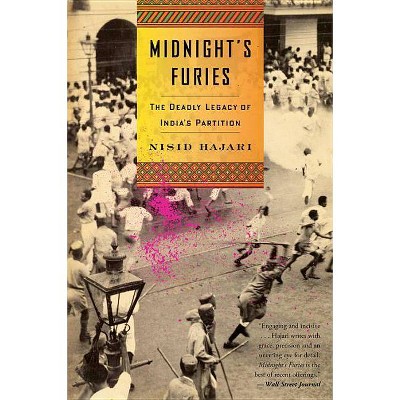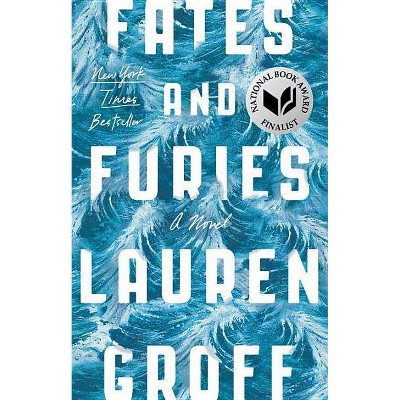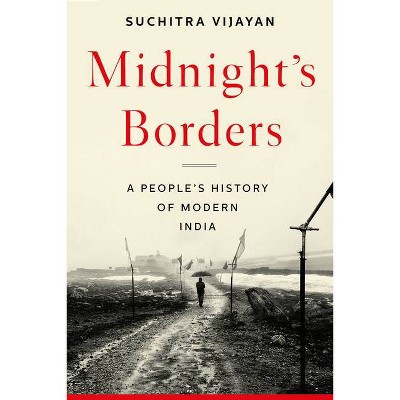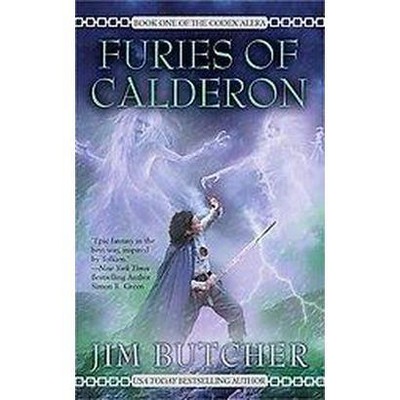Midnight's Furies - by Nisid Hajari (Paperback)

Similar Products
Products of same category from the store
AllProduct info
<p/><br></br><p><b> About the Book </b></p></br></br>The searing, under-reported history of the partition of India as a dramatic, bloody crisis that remains a key historical faultline today<p/><br></br><p><b> Book Synopsis </b></p></br></br><b>An NPR Book of the Year</b> <br><b>A <i>Seattle Times</i> Book of the Year</b> <br><b>William E. Colby Award Winner</b> <p/><b>"A beautifully written, deeply intelligent book about [a] crucial moment." -- Fareed Zakaria, CNN</b> <p/> Nobody expected the liberation of India and birth of Pakistan to be so violent--it was supposed to be an answer to the dreams of Muslims and Hindus who had been ruled by the British for more than a century. But as the summer of 1947 approached, Muslims, Hindus, and Sikhs were heavily armed and on edge after a year of riots and gang fighting, and the British rushed to leave. Hell broke loose. Trains carried Muslims west and Hindus east to their slaughter. Some of the most brutal and widespread ethnic cleansing in modern history erupted on both sides of the new border, searing a divide between India and Pakistan that remains a root cause of many of today's most menacing security threats, from jihadi terrorism to nuclear proliferation. Based on major new sources, Nisid Hajari's revelatory <i>Midnight's Furies</i> lays out the searing truth about one of the world's most momentous and least understood tragedies. <br><b> <br> "Fast-moving and highly readable . . . The story of what happens when a composite society comes apart." -- <i>New York Times Book Review</i> <p/> "Makes the complex and tragic story of the great divide into a page-turner." -- <i>Guardian</i> <p/> "Engaging and incisive . . . Hajari writes with grace, precision, and an unerring eye for detail. <i>Midnight's Furies </i>is the best of recent offerings." -- </b><i><b>Wall Street Journal</b></i><p/><br></br><p><b> From the Back Cover </b></p></br></br><b>An NPR Book of the Year</b><br /><b>A <i>Seattle Times</i> Book of the Year</b><br /><b>William E. Colby Award Winner</b><br /><br /> Nobody expected the liberation of India and birth of Pakistan to be soviolent it was supposed to be an answer to the dreams of Muslims and Hindus who had been ruled by the British for more than a century.But as the summer of 1947 approached, Muslims, Hindus, and Sikhs were heavily armed and on edge after a year of riots and gang fighting, and the British rushed to leave. Hell broke loose. Trains carried Muslims west and Hindus east to their slaughter. Some of the most brutal and widespread ethnic cleansing in modern history erupted on both sides of the new border, searing a divide between India and Pakistan that remains a root cause of many of today s most menacing security threats, from jihadi terrorism to nuclear proliferation. Based on major new sources, Nisid Hajari s revelatory <i>Midnight s Furies</i> lays out the searing truth about one of the world s most momentous and least understood tragedies.<br /><b><br /> Fast-moving and highly readable . . . The story of what happens when a composite society comes apart. <i>New York Times Book Review</i><br /><br /> Makes the complex and tragic story of the great divide into a page-turner. <i>Guardian</i><br /><br /> Engaging and incisive . . . Hajari writes with grace, precision, and an unerring eye for detail. <i>Midnight s Furies </i>is the best of recent offerings. </b><i><b>Wall Street Journal</b></i><br /><br /><b>Nisid Hajari </b>writes about Asian politics, history, and economics for the editorial board of <i>Bloomberg View</i>. He led international coverage at <i>Newsweek</i> for more than a decade and is a regular commentator on foreign affairs for the BBC, CNN, and NPR.<br /> "<p/><br></br><p><b> Review Quotes </b></p></br></br><br><p><b>Finalist for the Council on Foreign Relations' Arthur Ross Book Award * Finalist for the Shakti Bhatt First Book Prize * Finalist for the Tata Literature Live First Book Award</b> <p/> "This harrowing tale of political miscalculation and misunderstanding is recommended for all readers of history, politics, and current affairs." -- <i>Library Journal</i> <p/> "A fine unwinding of an epic event." -- <i>Booklist</i> <p/> "Hajari skillfully picks through this perilous history . . . A carefully restrained and delineated account makes for chilling reading." -- <i>Kirkus Reviews</i> <p/> "Pakistan is perhaps the world's most dangerous country--a combustible mix of nuclear weapons, jihadis, bloody borders, and a dysfunctional state. You can only truly understand the country by going to its roots. Nisid Hajari does just that in this powerful, intelligent, and beautifully written book. He finds in India's partition and its aftermath mistakes, compromises, and cowardice as well as all the ideology, venom, and violence that have now erupted onto the global stage. Hajari presents the history like a detective story and you will be swept along. Except in this case, none of us knows how it will end." -- Fareed Zakaria, author of <i>The Post-American World</i> <p/> "History is about grand cultural and geographical forces within which individual leaders must, nevertheless, take moral responsibility for better and worse outcomes. Nisid Hajari's meticulous study of India's birth captures this dichotomy brilliantly." -- Robert D. Kaplan, author of <i>Monsoon: The Indian Ocean and the Future of American Power</i> <p/> "India's partition in 1947 was a traumatic event unparalleled in its human toll since World War II. Its legacy continues to haunt both India and Pakistan and threaten global security. Yet the train of events that culminated in the paroxysm of violence and partition has remained shrouded in mystery. <i>Midnight's Furies</i> relies on fresh historical sources to go beyond the familiar debate about why Hindus and Muslims were at odds over the future of India, and shows how decisions by leaders reacting to unfolding events sealed the fate of united India and produced the cycle of violence that forever marked the peoples and governments of the region. Well-researched and eminently readable, this haunting account puts into the proper perspective both history and current events." -- Vali Nasr, author of <i>The Shia Revival</i> and <i>The Dispensable Nation</i> <p/> "Nisid Hajari brings new research, deep involvement, and a keen intelligence to write a history that brings so many people to life and will have you sitting on the edge of your seat. Today, with Pakistan facing unprecedented extremist violence and a hardline right wing government in New Delhi that wants no dialogue with Islamabad, we could be on the brink of more furies being unleashed. A must read." -- Ahmed Rashid, author of <i>Pakistan on the Brink</i> and <i>Taliban</i> <p/> "The Partition of British-ruled India in 1947 was a momentous event in world history that has impacted the war on terror as well as the politics and economy of Asia to a degree that is still not fully understood. Nisid Hajari's book illuminates it with a rare political acuity, narrative verve, and stylistic elegance. Unravelling canonized reputations and highlighting obscure ones, he shows how a large part of humanity came into its political inheritance, and the wounds this violent process left on the body politic of India and Pakistan. Anyone wondering how nuclear-armed South Asia came to be vulnerable to religious extremism will find clear and profound answers here." -- Pankaj Mishra, author of <i>From the Ruins of Empire</i> <br> </p><br><p/><br></br><p><b> About the Author </b></p></br></br>NISID HAJARI writes about Asian politics, history, and economics for the editorial board of <i>Bloomberg View</i>. He led international coverage at <i>Newsweek</i> for more than a decade and is a regular commentator on foreign affairs for the BBC, CNN, and NPR.
Price History
Price Archive shows prices from various stores, lets you see history and find the cheapest. There is no actual sale on the website. For all support, inquiry and suggestion messages communication@pricearchive.us




















